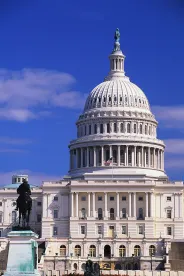Prior to adjournment, the 113th Congress passed the first changes to the Dodd-Frank Wall Street Reform and Consumer Protection Act (P.L. 111-203, “Dodd-Frank”) since the landmark legislation was signed into law by President Obama on July 21, 2010. The changes partially repeal the “swaps push-out” rule and make clear the Federal Reserve Board’s authority to develop insurance-based capital standards for systemically important insurance companies under its supervision.
A third change, to exempt manufactures, agricultural businesses and other nonfinancial end-users of derivatives from the derivative regulations issued under Dodd-Frank, was included in legislation to extend the Terrorism Risk Insurance Act (TRIA). Sen. Tom Coburn (R-OK) launched a strong opposition at the last minute over a states’ rights issue unrelated to Dodd-Frank. Rather than going through several days of procedural delays to end debate and bring up TRIA for a vote, Senate leaders opted to adjourn for the year. However, Republican Leadership in the House and incoming Senate Banking Committee Chairman Richard Shelby (R-AL) have indicated they intend to move on TRIA legislation when the new Congress convenes in January.
With Republicans controlling the agendas of both Houses of Congress next year, additional changes to Dodd-Frank will be in play. Enactment of new laws affecting Dodd-Frank will depend on sufficient support from Democrats in the Senate, in order to both neutralize a filibuster threat by Democrats opposed to changes in Dodd-Frank and to signal to President Obama that the changes are more pragmatic rather than partisan. The president’s willingness to sign bills passed in the lame duck session that modify the swaps push-out rule and clarify capital requirements for systemically important insurance companies indicate the potential for White House support for further pragmatic changes to Dodd-Frank in the 114th Congress.
Swaps Push-Out Rule
As originally enacted, Section 716 required banks to wall off certain swaps trading activities into separately capitalized affiliates of the bank holding company that don’t have access to federal assistance including advances from a Federal Reserve credit facility or discount window and federal insurance on bank deposits. Swaps tied to interest rates, foreign exchange, precious metals such as gold and silver, and credit default swaps that are centrally cleared were exempt. The remaining types of swaps, including those tied to stocks, certain credit default swaps, commodity-based swaps and so-called structured finance swaps were covered by the Section 716 push-out rule.
However, as part of a $1.1 trillion spending bill that President Obama signed Dec. 16, 2014, Congress partially repealed the “swaps push-out” rule in Section 716 of Dodd-Frank.
The repeal language says the push-out rule “shall not apply to any covered depository institution that limits its swap and security-based swap activities” to “hedging and other similar risk mitigating activities directly related to the covered depository institution’s activities” and “acting as a swaps entity for swaps or security-based swaps other than a structured finance swap.” The bill defines a structured finance swap as “a swap or security-based swap based on an asset-backed security (or group or index primarily comprised of asset-backed securities).”
But, the bill also permits certain structured finance swap trading activities to be exempt from the push-out rule if “such structured finance swaps are undertaken for hedging or risk management purposes; or each asset-backed security underlying such structured finance swaps is of a credit quality and of a type or category with respect to which the prudential regulators have jointly adopted rules authorizing swap or security-based swap activity by covered depository institutions.” Thus, the changes to Section 716 effectively let back into the bank holding company nearly all swaps activities and only bar structured finance swaps that are not designed as hedges, or have poor credit quality.
Congressional Republicans and the banking industry supported the changes to Section 716 including community banks. American Bankers Association’s Executive Vice President James Ballentine said in a press release. “The majority of banks, including community banks, that use swaps do so in order to hedge or mitigate risk from their ordinary business activities, including lending. …The push-out requirement to move some swaps into separate affiliates makes one-stop shopping impossible for businesses ranging from family farms to energy companies that want to hedge against commodity price changes.”
Many Democrats opposed the changes to Section 716, including Sen. Elizabeth Warren (D-Mass.), who led the Democratic opposition in the Senate. Warren said the changes to the swaps push-out rule “would let derivatives traders on Wall Street gamble with taxpayer money and get bailed out by the government when their risky bets threaten to blow up our financial system. …These are the same banks that nearly broke the economy in 2008 and destroyed millions of jobs.” But, other Democrats and President Obama supported the changes as part of a compromise in the “must-pass” annual spending bill, which also included significant funding increases for the enforcement budgets at the Commodity Futures Trading Commission and the Securities and Exchange Commission.
Capital Standards for Systemically Important Insurance Companies
On Dec. 10, 2014, the House of Representatives passed the Insurance Capital Standards Clarification Act of 2014 (S. 2270), to make clear that under Section 171 of Dodd-Frank, the Federal Reserve has the ability to develop insurance-based capital standards for insurers that have been designated systemically important financial institutions (SIFIs) by the Financial Stability Oversight Council (FSOC). (AIG, Prudential and MetLife have been designated as SIFIs by FSOC) Federal Reserve officials had said they didn’t have the discretion under Section 171 to apply different capital standards for banks and for insurers.
Because the House adopted a bill previously enacted by the Senate, without amendment, S. 2270 went directly to the president, who signed it Dec. 18, 2014.
S. 2270 amends Dodd-Frank Act by adding a new “Clarification” subsection at the end of Section 171 that provides in part:
“In establishing the minimum leverage capital requirements and minimum risk-based capital requirements on a consolidated basis for a depository institution holding company or a nonbank financial company supervised by the Board of Governors as required under paragraphs (1) and (2) of subsection (b), the appropriate Federal banking agencies shall not be required to include, for any purpose of this section (including in any determination of consolidation), a person regulated by a State insurance regulator or a regulated foreign subsidiary or a regulated foreign affiliate of such person engaged in the business of insurance, to the extent that such person acts in its capacity as a regulated insurance entity. (Section 171 (c) (1))
“A depository institution holding company or nonbank financial company supervised by the Board of Governors of the Federal Reserve that is also a person regulated by a State insurance regulator that is engaged in the business of insurance that files financial statements with a State insurance regulator or the National Association of Insurance Commissioners utilizing only Statutory Accounting Principles in accordance with State law, shall not be required by the Board under the authority of this section or the authority of the Home Owners' Loan Act to prepare such financial statements in accordance with Generally Accepted Accounting Principles.” (Section 171 (c) (3) (A))
Statutory accounting principles (SAP) are accounting procedures used in the insurance industry. The National Association of Insurance Commissioners mandates that all insurance companies follow SAP. An insurance company’s annual statement indicates its value as if it were in liquidation rather than continuing in business. This is a more conservative value, as an insurance company cannot include revenue that has not been invoiced.
SAP applies only to the insurance industry. All other industries use generally accepted accounting principles (GAAP). Their normal operations generally involve selling a product or service and rarely do they have to refund the customer more than the original amount paid. But, the insurance industry is different. It plays the odds when selling policies. Insurance companies know they will have to pay out on some of the policies they sell, but they are betting that the amounts will not be more than they anticipated. If they wind up having to pay significantly higher amounts, however, they could deplete their financial reserves, with the possibility of filing bankruptcy. Therefore, they must file annual reports that reflect the health of the company on the last day of the fiscal year.



 />i
/>i

